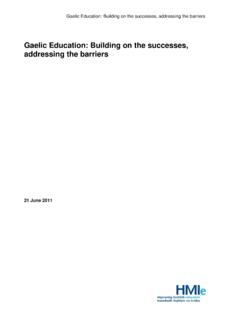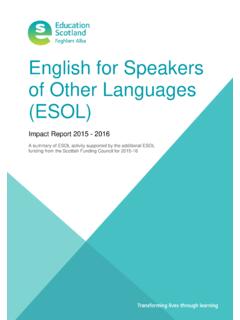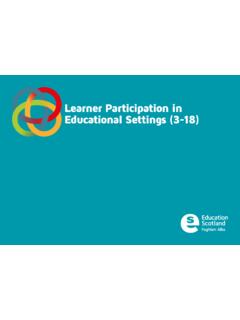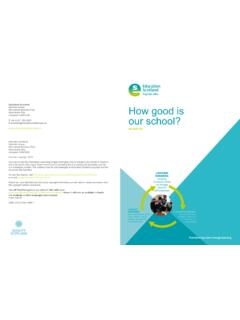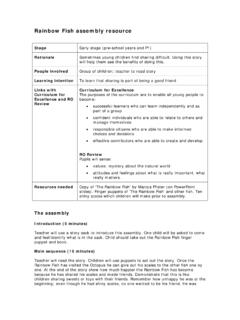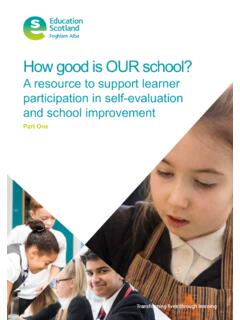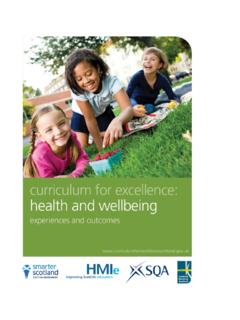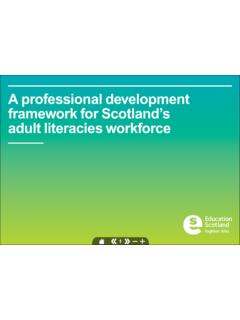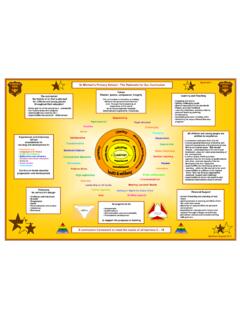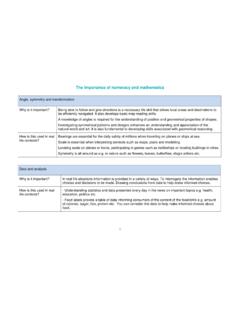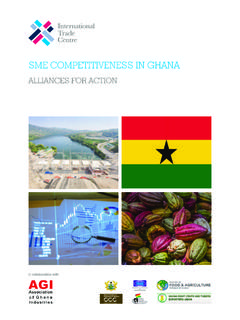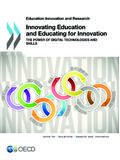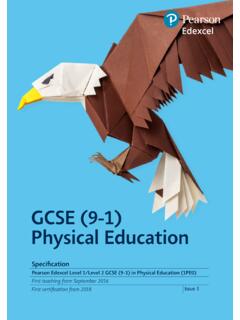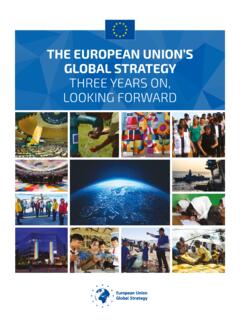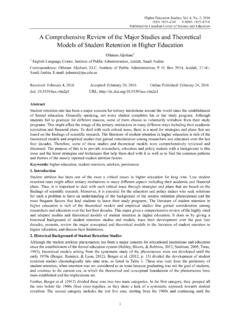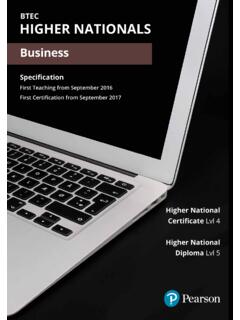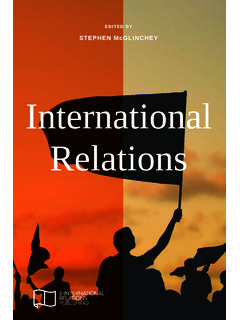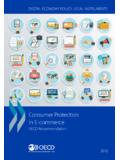Transcription of Vision 2030+ - Education Scotland
1 Vision 2030+ Concluding report of the learning for sustainability National Implementation GroupMarch 2016 Vision 2030+ CONCLUDING REPORT OF THE learning FOR sustainability NATIONAL IMPLEMENTATION GROUP02312 21 2428284041 CONTENTSEXECUTIVE SUMMARYPROGRESS AND ACHIEVEMENTSO verview of progress since 2013 Vision 2030+ Reorienting learning to create a more sustainable futureMAKING THE Vision A REALITYR ecommendations for 2016 onwardsAPPENDICES Details of progress against recommendationsMembership of implementation and working groupsGlossary of acronyms By 2030 ensure all learners acquire knowledge and skills needed to promote sustainable development, incuding among others through Education for sustainable development and sustainable lifestyles, human rights, gender equality, promotion of a culture of peace and non-violence, global citizenship, and appreciation of cultural diversity and of culture s contribution to sustainable development.
2 UN Sustainable Development Goal cover photo credit: Alan RichardsonVISION 2030+ CONCLUDING REPORT OF THE learning FOR sustainability NATIONAL IMPLEMENTATION GROUP03In March 2013 Scottish Ministers accepted all thirty-one recommendations of the learning for sustainability (LfS) report1. The report recommended that every learner should receive their entitlement to LfS and every practitioner should demonstrate LfS in their practice. In addition, it called for every school and centre to develop a coherent, whole school approach that impacts on their establishment s culture, curriculum and campus and connects them fully to their wider communities. The report introduced LfS as a concept and process which weaves together sustainable development Education (SDE), global citizenship and outdoor learning into a unifying Vision of learning for a better SUMMARYThe LfS National Implementation Group, which was established in February 2014 to deliver on the recommendations, is greatly encouraged by the progress that has been made.
3 Recognition is due to local authorities, the LfS Working Group and also the many third sector organisations and networks that have embraced the LfS report and agenda with enthusiasm and have given it life in so many ways. Above all we want to celebrate the passion, leadership and professional values and actions of practitioners and school leaders across Scotland . Their commitment to embedding LfS in the curriculum is helping to nurture a generation of children and young people who know and value the natural world. They are also committed to the principles of social justice, human rights, global citizenship, democratic participation and living within the ecological limits of our planet. This report is very much a celebration of the wonderful learning and teaching that is taking place in schools and early learning and childcare settings across Scotland as a result of that commitment.
4 The tweets that permeate this report have been inserted to give a flavour of the inspirational practice that learners of all ages are experiencing on a daily basis in classrooms and outdoor are very fortunate in Scotland to have highly qualified and motivated practitioners who really care about learners and who believe passionately in social justice, learner voice and values-based approaches to learning and teaching. 1 learning for sustainability Report, One Planet Schools Working Group (Dec 2012) 2030+ CONCLUDING REPORT OF THE learning FOR sustainability NATIONAL IMPLEMENTATION GROUP04In Curriculum for Excellence, we have a flexible and permissive framework for learning and teaching which gives teachers freedom to make learning as engaging, meaningful, challenging, enjoyable and relevant as it can be.
5 We trust in the professionalism of teachers to do the very best for learners and many have realised the enormous potential of LfS to help them achieve this. Some of those who have taken this approach report a significant impact on learners: greater confidence; increased readiness and motivation to learn; increased attainment; progression in social, critical thinking and communication skills. They also report that LfS significantly enhances relationships, the sense of community spirit, parental engagement and the reputation of their establishment. Staff too report that their learning and teaching has been reinvigorated and that staff wellbeing and attendance has improved all as a result of adopting LfS approaches.
6 At a national level, there have been many successes and developments in the last two years. The following are worthy of special mention: the embedding of LfS in the General Teaching Council for Scotland (GTCS) Professional Standards; the publication by Education Scotland of How Good is Our School 4? which secures LfS within the framework for self-evaluation and self-improvement; and the passing of the Children and Young People s Act ( Scotland ) 2014 which enshrines in the Education system enhanced duties in relation to the United Nations Convention on the Rights of the Child (UNCRC). These developments will ensure that LfS will be rooted in the very fabric of school Education and will undoubtedly help to bring about transformational change at system level.
7 In addition, the partnership working between the different agencies, third sector organisations and networks connected to the various aspects of the LfS agenda has been hugely encouraging. The spirit of collaboration, openness and common values amongst these bodies has clearly been further enhanced by the concept of LfS as outlined in the LfS Report. The combined expertise, reach and capacity of these organisation and networks, aligned to the Vision of LfS, will be a powerful vehicle for change as we enter the next Alasdair Allan MSP, Minister for learning , Science and Scotland s LanguagesAnd at the same time as Scotland was identifying and implementing LfS goals at a national level a parallel process was taking place globally.
8 The United Nations Sustainable Development Goals (SDGs), launched in New York in September 2015, set out a seventeen-point global action plan to end poverty, combat climate change and fight injustice and inequality. Unlike their predecessor, the Millennium Development Goals, which were targeted towards developing nations, the SDGs are for every nation. Scotland s First Minister, Nicola Sturgeon, ensured that Scotland was the first country in the world to sign up to these 2015-2030 goals. In particular, Education Goal will provide crucial forward momentum for the LfS agenda in Scotland , building on all that has been achieved over the course of the United Nations Decade of Education for Sustainable Development which concluded in December 2014.
9 Vision 2030+ CONCLUDING REPORT OF THE learning FOR sustainability NATIONAL IMPLEMENTATION GROUP05 The LfS Implementation Group is not complacent, however, and we are mindful of our duty to advise Scottish Ministers of the work that remains to be done and the challenges that lie ahead. These include: Promoting awareness of LfS as a concept and process so it is universally understood Taking LfS forward at a time of financial constraint with growing pressures on staff at school level and system leaders at local and national level Embedding LfS in professional review and development (PRD) processes at school level or through self-evaluation, to ensure it is not treated superficially but rather that it brings about more profound and deeper change Ensuring that LfS is not crowded out of school, local and national improvement plans due to other priorities and initiatives.
10 To address these challenges, and to signal the direction we need to take to ensure continued progress, we have set out a Vision for LfS through to 2030 and beyond. This is to ensure we do not lose sight of what is at stake, and to serve as a reminder of the importance of LfS to our children and young people and our collective and foremost we invite all practitioners, school leaders and system leaders to continue to make the most of the opportunities that already exist. Scotland has one of the most progressive approaches to LfS in the world, and this is supported at many levels. We hope this provides a sense of freedom and that practitioners and school leaders feel energised to extend and deepen their practice.
